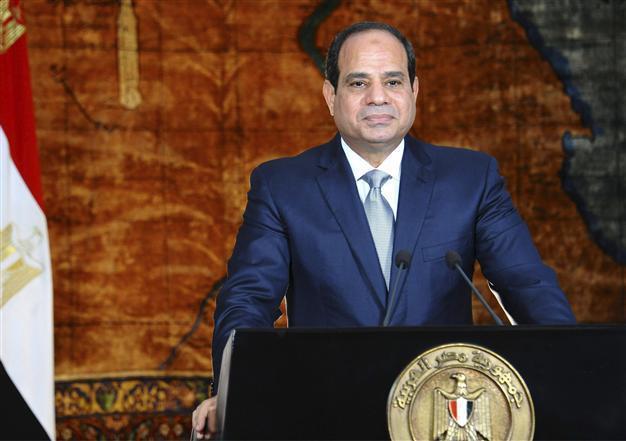Turkey lashes out at Egyptian leadership, quarrel escalates
ANKARA

Egyptian President Abdel Fattah al-Sisi delivers a speech in Cairo. Cold winds between Erdoğan and Sisi have persisted, despite closed-door attempts to mend ties between the two traditionally friendly countries. REUTERS Photo
A quarrel between Turkey and Egypt has escalated, with Ankara accusing Cairo of carrying out "undemocratic acts" and vowing that its criticism will continue if the Egyptian administration does not take steps toward democracy, freedom and equality.“Our sincere calls for the fulfillment of the Egyptian people’s demands for democracy, freedom, equality and prosperity will continue until concrete improvements are observed in this issue. Our country will not hesitate to disclose the necessary sensitivity in ending human rights violations in Egypt and in respecting the free will of the brotherly Egyptian people,” read a written statement from the Turkish Foreign Ministry, released late Sept. 30.
The statement was a response to an Egyptian Foreign Ministry statement issued on Sept. 29, which accused Turkey of interfering in Egypt’s domestic affairs. Egypt strongly denounced President Recep Tayyip Erdoğan’s address to the U.N. General Assembly, in which he described the current Egyptian administration as "coup plotters."
Cold winds between Erdoğan and Egypt’s Abdel Fattah el-Sisi have persisted, despite closed-door attempts to mend ties between the two traditionally friendly countries. A recent attempt to spark dialogue between the two foreign ministers in New York was nixed after Erdoğan’s strongly-worded criticism at the U.N.
The long statement issued by the Turkish Foreign Ministry described the Egyptian accusations against Turkey as reflections of a guilty conscience and incompetence. “Naturally, these claims can neither be taken seriously nor are acceptable,” it said.
It also cited human rights violations in Egypt occurring since July 3, 2013, the day when the army toppled the democratically elected President Mohamed Morsi. These violations included the killing of numerous demonstrators on a single day and the arrests of thousands, which independent human rights organizations have labeled “crimes against humanity.”
“Describing the reactions against these treatments that disregard the Egyptian people’s will and sovereignty as interventions in internal affairs is not acceptable, either. The principle of non-intervention in internal affairs cannot be used as a tool to legitimize tyranny and arbitrary moves against the Egyptian people and human rights violations," it stated.
"When it comes to human rights and constitutional legitimacy, Turkey, like other responsible members of the international community, has the ethical, legal and conscientious responsibility to reassure the Egyptian people’s fundamental rights. It would constitute a delusion on behalf of the Egyptian administration to expect a termination of the international community’s criticisms as long as its undemocratic acts continue [in an environment] far from political inclusiveness,” it added.
















